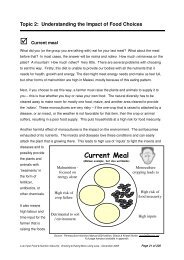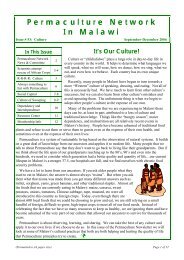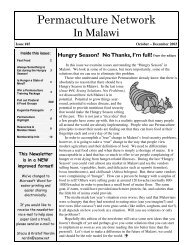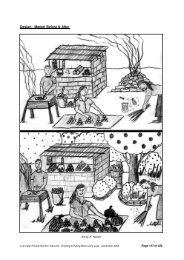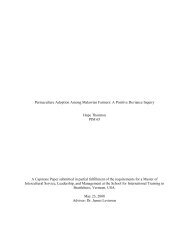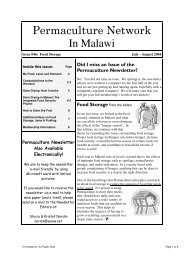Harmonisation of seed laws in Africa.indd - Never Ending Food
Harmonisation of seed laws in Africa.indd - Never Ending Food
Harmonisation of seed laws in Africa.indd - Never Ending Food
You also want an ePaper? Increase the reach of your titles
YUMPU automatically turns print PDFs into web optimized ePapers that Google loves.
GRICULTURE, ENERGY AND LIVELIHOOD SERIES<br />
ANNEX 1 Glossary <strong>of</strong> selected terms<br />
Landraces, traditional varieties and farmers’ varieties.<br />
These terms are used <strong>in</strong>terchangeably and refer to local varieties <strong>of</strong> domesticated plant species,<br />
which were bred and selected by farmers over time. They are genetically diverse, dynamic, have<br />
specific characteristics, and are highly adapted to the environment <strong>in</strong> which they have evolved.<br />
They have a high capacity to tolerate environmental stress and therefore produce very stable yields.<br />
Farmers’ varieties are always open-poll<strong>in</strong>ated (can be cross- or self-poll<strong>in</strong>ated).<br />
Open-Poll<strong>in</strong>ated Varieties (OPV)<br />
Open-poll<strong>in</strong>ated plants are those that require poll<strong>in</strong>ation by the w<strong>in</strong>d, <strong>in</strong>sects, or the farmer to set<br />
fruit and produce <strong>seed</strong>s. In some cases, the plant will produce both male and female flowers on the<br />
same plant, which means self-poll<strong>in</strong>ation can take place. In other cases, cross-poll<strong>in</strong>ation is needed.<br />
The key issue with OPVs is that farmers can save <strong>seed</strong> and the <strong>of</strong>fspr<strong>in</strong>g will cont<strong>in</strong>ue to be viable.<br />
Self-Poll<strong>in</strong>ated plants<br />
Self-poll<strong>in</strong>ated plants are plants where the pollen and stigma are present <strong>in</strong> the same flower. Often,<br />
all that’s required for poll<strong>in</strong>ation is the act <strong>of</strong> the flower open<strong>in</strong>g, which will transfer pollen to the<br />
stigma. Self-poll<strong>in</strong>ated plants produce true from <strong>seed</strong>.<br />
Cross-poll<strong>in</strong>ated plants<br />
Cross-poll<strong>in</strong>ation is where the pollen and stigma are produced by different flowers and the pollen<br />
has to travel over a distance to fertilise the plant.<br />
Farmers’ rights<br />
Farmers’ rights are those rights aris<strong>in</strong>g from the past, present and future contributions <strong>of</strong> farmers <strong>in</strong><br />
conserv<strong>in</strong>g, improv<strong>in</strong>g and mak<strong>in</strong>g available genetic resources, particularly those <strong>in</strong> the centres <strong>of</strong><br />
orig<strong>in</strong>/diversity. Additionally, the term refers to farmers’ rights to use, exchange and sell farm saved<br />
<strong>seed</strong> and other propagat<strong>in</strong>g material, and to participate <strong>in</strong> decision-mak<strong>in</strong>g.<br />
Hybrids<br />
Hybrids can only be produced by cross-poll<strong>in</strong>at<strong>in</strong>g plant varieties. An F1 hybrid is produced by<br />
cross<strong>in</strong>g and backcross<strong>in</strong>g the pure l<strong>in</strong>es <strong>of</strong> different varieties over a number <strong>of</strong> seasons. When you<br />
plant an F1 hybrid <strong>seed</strong>, you get a plant that has the attributes the breeder has bred <strong>in</strong>to the <strong>seed</strong>,<br />
but if you save the <strong>seed</strong>, the next generation will not breed true: i.e. its characteristics will revert<br />
back to one <strong>of</strong> the orig<strong>in</strong>al parent l<strong>in</strong>es, which can vary a great deal. It is not viable to save hybrid<br />
<strong>seed</strong>s.<br />
<strong>Harmonisation</strong> <strong>of</strong> <strong>Africa</strong>’s <strong>seed</strong>s <strong>laws</strong>: a recipe for disaster 37



